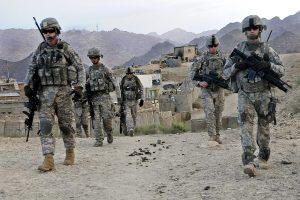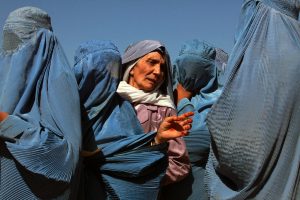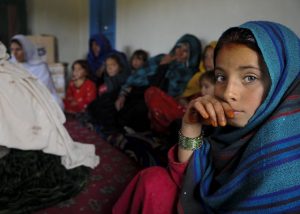By guest contributors Ashutosh Anand* and Kaustubh Kumar**
INTRODUCTION
The deal between the US and the Taliban signed in February 2020 stated that the US and its allies would withdraw all its troops from Afghanistan within 14 months. On August 31, 2021, all American forces have already withdrawn from Afghanistan, which has consequently unleashed havoc on the rights of Afghani women.

When the US and its allies waged war on Afghanistan, the defense of women’s rights was one of their prime reasons to justify their invasion and subsequent occupation. The post-Taliban constitution, enacted in 2004, provided women with most of the basic human and civil rights. Moreover, under American troops’ presence, the post-Taliban regime followed a liberal policy towards women by providing access to healthcare, education, and work. For women’s empowerment in politics, the government also offered a 27 percent reservation of seats for women in Wolesi Jirga (House of People) of Afghanistan, which helped uproot the conservative mindset for women in Afghan families.
Women and girls have remained a primary target of the Taliban for decades. After the recent withdrawal of the US troops, the Taliban belligerently advanced its territories in Afghanistan and captured the capital. It is a significant setback to all government policies as the Taliban would undoubtedly give force to the laws laid down in doctrinaire versions of Sharia that reduce women’s rights and freedoms. The implication on women residing in rural areas of Afghanistan would have more dire consequences, where the Taliban already had absolute control.
Further, the women residing in urban areas of Afghanistan are already being targeted by the Taliban. Recent instances like the Taliban’s bomb attack on girls hostel where more than 80 girls died, detaining and killing of women journalists, and women being lashed 40 times just for talking to a man on the phone, are enough to predict the future of women’s rights in Afghanistan under Taliban regime. Consequently, nearly 20 percent of the women journalists in Afghanistan have quit or lost their jobs, owing to targeted killings
ACTIONS OF THE TALIBAN VIS-À-VIS INTERNATIONAL LAWS
The present and any future Afghan regime are obligated by the basic principles of international conventions signed and ratified by the previous Afghani governments. However, when the Taliban was in power from 1996 to 2001, there were dreadful transgressions of the below-mentioned laws, to which the Taliban was liable.
The International Covenant on Civil and Political Rights (ICCPR) guarantees freedom of association, peaceful assembly, and mobility. The Taliban’s laws and policies practically imposed an indefinite ban on all forms of women’s association, assembly, and freedom of movement. The right to freedom of movement is also guaranteed by the Universal Declaration of Human Rights (UDHR). The Taliban’s orders prohibiting women’s public movement were gender-discriminatory and violated equality before the law for Afghan women under the ICCPR’s principle.
Under the Taliban’s regime, women were compelled to quit their jobs. However, the UDHR, Convention on the Elimination of All Forms of Discrimination against Women (CEDAW), and the International Covenant on Economic, Social, and Cultural Rights (ICESCR), direct states to recognize the right of everyone to earn their living through work, which an individual freely chooses or accepts.
The right to education for all is likewise included in the UDHR, ICESCR, Convention on the Rights of the Child (CRC), and CEDAW. The CEDAW requires states to tackle the obstacles that women, particularly those living in rural regions, encounter in exercising their right to equality in education. Under the ICESCR and CRC, states must provide universal primary and secondary education without gender discrimination and equal access to higher educational opportunities. Contrary to these statutes, in 1996, the Taliban gradually closed several women’s universities and schools and restricted girls from attaining education entirely.
Afghan women were also exposed to arbitrary corporal punishments without due process. International law requires states to penalize violations of bodily integrity and to make efforts to protect women from gender-based discrimination and oppression. The ICCPR provides protection from gender-based brutality by guaranteeing the right to life, the right not to be tortured or subjected to cruelty, inhumane or degrading treatment or punishment, the right to liberty and security, and the right to equality before the law. Unfortunately, the Taliban never gave heed to these international regulations.
SUBJECTING THE TALIBAN TO INTERNATIONAL LAWS
Afghanistan is a signatory to numerous human rights laws empowering women, including the statutes mentioned above. However, there exists an unanswered question whether the Taliban, currently a non-state actor, can be subjected to enforce those laws?
Persons or entities with international personalities are referred to as ‘subjects’ of international law. International organizations and several other non-state entities are included as ‘subjects’ of international law under the Functional theory. Therefore, although states remain the primary ‘subjects’ of international law, international organizations and some non-state entities and individuals have also come under the ambit of the ‘subjects’ of international law due to its evolving nature. Thus, a state made and ruled by a non-state actor like the Taliban can also be subjected to international regulations.
The Montevideo Convention, 1933, defines four essential attributes for the qualification of a state, specifically, a permanent population, a defined territory, a government, and the capacity to enter into relations with the other states. Afghanistan already satisfies all these attributes.
Recognition means acknowledging the political entity of another state within the sense of international law. Recognition is mainly of two types: de facto recognition and de jure recognition. The former is provisional and temporary in nature, whereas the latter is formal and definitive.
As the belligerent forces (in this case, the Taliban) has gained control of the substantial part of Afghanistan and are in revolt with the ousted government, the international organizations and countries may grant them de facto recognition until they resolve the power-sharing dispute within their country, bargain solutions on the rising insurgency against themselves, or start exercising their complete control over the state.
Moreover, the Constitutive theory of recognition says that essential attributes of the state are not necessary. An entity can be called a state when other states recognize it. Austrian jurist Hans Kelsen modified this theory and said that natural statehood exists in a state as soon as it attains essential attributes of statehood. However, Juridical statehood only exists in a state after recognition by other states. Furthermore, there are various doctrines, some of which say that a government made by force shall not be recognized, while some are contrary to the aforementioned idea.
Consequently, there is an absence of concrete, explicit and obligatory laws for recognition of the government. Thus, it depends on other states’ discretion to grant recognition to a state or government. Recognition of the Taliban would be vital to subject it to international laws, particularly associated with women’s rights.
FUTURE COURSE OF ACTION: IS MODUS VIVENDI A WAY FORWARD?

After gaining the capital, the Taliban spokespersons have often stated that all Afghans must live “within the framework of Islam”. In addition, they will let women work and study inside the confines of “Sharia” law. Prima facie, the former statement makes it look like the Taliban has changed its radical stance to a more liberal one. However, if the comments are analyzed deeply, many cavities appear. For instance, even though the Taliban is ‘not restricting’ women’s education, they do not consider co-educational learning in accordance with their interpretation Sharia law. In their opinion, when girls hit puberty, they should not be taught along with the boys. Furthermore, male teachers will not be allowed to teach girls.
This will pose a two-faceted threat to women’s education. Firstly, there is a lack of adequate infrastructure in terms of ‘girl schools,’ in which girls could continue their studies. Secondly, the majority of teachers in Afghanistan are male, especially in higher studies. Under the garb of lip-service of women education, the Taliban can easily utilize the loopholes highlighted above and deprive women of education.

Therefore, it is vital to note that the Taliban can exploit women’s rights not only in education but other dimensions too. Consequently, the role of the international community becomes significant. The Taliban has already gained control of the entire landmass of Afghanistan. It is eager to establish itself as a political power. It was seen that even with the ongoing civil war and the quest to capture the capital, the Taliban was active at the diplomatic front and kept engaging with countries like Russia, China and Afghanistan’s neighbors to fend off any hostility from them. The Taliban has also voiced that it would institute a ruling council to govern Afghanistan. As the Taliban zealously wants international recognition from its government, other nations may utilize the Taliban’s aspirations to make sure that the Taliban respects human rights law in consideration for other countries’ recognition of it. Hence, the countries may pressurize them to impose a liberal interpretation of ‘Sharia’ and adhere to the principles of the rule of law. They can also call the Taliban to establish their own constitution, which can pave the way to dispense basic rights to women as provided in Saudi Arabia and other Muslim countries, which use a major degree of Sharia jurisprudence in their lex loci.
Moreover, major Arab countries like Saudi Arabia and the UAE have recently initiated granting fundamental rights to women, which were withheld for centuries. The aforementioned countries exercise a substantial degree of influence over the Taliban (as they were the only countries apart from Pakistan to recognize the Taliban between 1996 to 2001), and can play a crucial role in keeping a check on it concerning women’s rights. Further, the United Nations, before deliberating on the entry of the Taliban to the General Assembly, may enter into a pact with the Taliban mentioning that it would not impose any unreasonable restriction on the rights and liberties of women.
The international fora should see that women’s rights and freedoms must not be traded for a hasty political settlement and power-sharing agreement. The US can play a substantial role in influencing world opinion, as it not only has a moral duty but a demographic demand too, as Afghani women account for nearly half of the population.
* Ashutosh Anand is a BA.LL.B. (Hons.) student at the National University of Study and Research in Law, Ranchi, Jharkhand.
** Kaustubh Kumar is a BA.LL.B. (Hons.) candidate at the National University of Study and Research in Law, Ranchi, Jharkhand.
Photos
“Afghan women voice concerns to coalition forces [Image 4 of 4]” by DVIDSHUB is licensed under CC BY 2.0
“Afghanistan patrol” by The U.S. Army is licensed under CC BY 2.0
“Afghan Women Queue at World Food Programme Distribution Point” by United Nations Photo is licensed under CC BY-NC-ND 2.0
